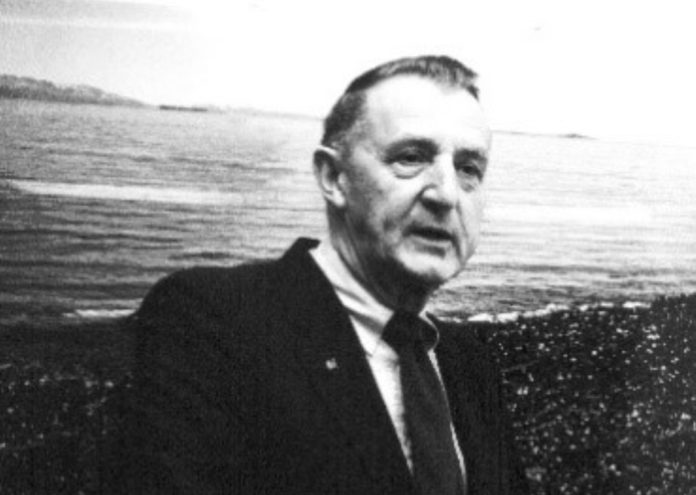John A. Sandor, born in Buckley, Washington on Dec. 22, 1926, passed away on Aug. 23, 2022 at 95 years old in Sitka. John was the youngest son of John and Mary Sandor, whose family of five sons and three daughters were all raised on a small ranch in Buckley.
Professionally, John was an Army medic in World War II; received a Bachelor’s in Forestry degree from Washington State University in 1950 and a Master’s of Public Administration degree from Harvard in 1959. Sandor’s Forest Service career began in 1953 when he came to Alaska to work on forest surveys of the Tongass National Forest. He held a succession of other posts with the Forest Service, including Assistant Regional Forester in personnel management for the Southern Region in Atlanta from 1965 to 1968; Assistant to Chief Ed Cliff in the Washington Office from 1968 to 1971; and Deputy Regional Forester in the Eastern Region from 1971 to 1976. In 1976, Sandor returned to Juneau as Regional Forester.
Sandor was active in forming the Society of American Foresters Alaska Chapter and Section; and was also active in the American Society for Public Administration. Sandor retired from the Forest Service in 1984. He was appointed Commissioner of the Alaska Dept. of Environmental Conservation during the Hickel administration from 1990 to 1994. During this time he was also a member of the Exxon Valdez Oil Spill Trustee Council.
One of his favorite quotations was, “If a task you’ve once begun, do not leave until it’s done. Be the labor great or small, do it well, or not at all.”
It is challenging to list the many accolades, awards and distinctions John earned in his service to the community, state and country. However, here are a few notable items to mention:
Sandor received the Alaska Federation of Native’s 1994 Denali Award for efforts to preserve Native values. He also received the Alaska Public Health Association’s Health Achievement Award for water-sanitation and clean air act initiatives. He also worked cooperatively with Canadian officials in British Columbia and Yukon Territory on conservation, water-sanitation, and hydro-electric issues.
In 2007, Sandor received the Gifford Pinchot Medal from the Society of American Foresters. This award recognizes an SAF member who has made outstanding contributions in the administration, practice, and professional development of North American Forestry. He is named as “Director Emeritus” of the First Things First – Alaska Foundation and was a founding member of Juneau’s Gold Rush Days. He is also a past recipient of a “Lifetime Achievement Award” from the Juneau Chamber of Commerce.
Personally, John was married to the love of his life, Lenore Barbat, on May 18, 1956 in Juneau. John was an avid fan of Mozart, travel, rare books and maps, and his two grandsons, Benjamin and Jacob Freiman. John thrived on staying active in the community and was often seen attending Rotary, Masonic Lodge, Miners, Chamber of Commerce and was an active member of the Douglas Community United Methodist Church. After residing in Juneau for 40 years, John moved to the Sitka Pioneer Home with his wife, Lee, in 2017.
John was preceded in death by his parents, four older brothers (Charles, William, Henry, and Frank), and three sisters (Helen Carden, Pat Hoyle and Margaret Bryant) and his dear wife, Lenore. He is survived by his oldest daughter (Mary Helen of Anchorage, Alaska) and youngest daughter (Janet Freiman of Danville, California), his son-in-law, Harold Freiman, and the two grandsons he adored, (Ben and Jacob Freiman). He is also survived by many beloved nieces and nephews and other relatives, most specifically in Washington State and Ohio. Family meant everything to John and he holds each and every one of them dearly.
The family would welcome donations in John’s memory to the National Museum of Forest Service History, or simply plant a tree in his name.
(This obituary first appeared at Legacy.com)
